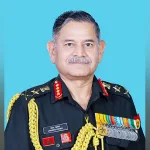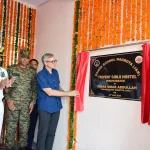PM Modi chairs Chief Secretaries conference heralding new era of Cooperative Federalism
ANI | Updated: Jan 06, 2023 14:31 IST
New Delhi [India], January 6 (ANI): Prime Minister Narendra Modi chaired the national conference of Chief Secretaries focused on achieving rapid and sustained economic growth in partnership with the states, in the national capital on Friday.
The three-day conference began yesterday. The idea behind this conference is that cooperative federalism, through Central Ministries and departments working together with States in seamless coordination, is an essential pillar for the development and progress of New India.
With this vision in mind, PM Modi conceptualised this conference, which was held for the first time in June 2022 in Dharamshala.
This year, the National Conference of Chief Secretaries is being held from January 5 and will conclude on January 7. More than 200 bureaucrats comprising representatives of the central government, chief secretaries and other senior officials of all States/Union Territories and domain experts, are participating in the conference, said the statement from Prime Minister’s Office (PMO).
This is not an isolated example of when PM Modi has tried to leverage Cooperative Federalism to usher in efficiency and synergy in order to respond to many of India’s intractable challenges. In the last 8 years, PM Modi has worked to make the process of policy-making and implementation more collaborative and consultative, thus making India more federally governed.
The statement list numerous occasions where PM Modi has taken steps to strengthen the federal structure of India and improve centre-state relations.
The Aspirational Districts Program was launched by PM Modi in January 2018 with the objective of expediting the transformation of the most backward districts across the country through the convergence of government programmes and schemes.
The broad strategy of the Aspirational Districts Programme includes: Convergence – between Central and State Schemes; Collaboration – between Centre, State, District Administration, Development Partners and Citizens; and Competition – between Districts.
Having had the vast experience of governing a state as CM of Gujarat, PM Modi knows that the key to development for states is the availability of sufficient resources. Taking a significant step in this direction, the government took the decision to increase states’ share in the divisible pool of taxes from 32% to 42%. This has provided states with more resources to design and implement programmes as per their requirement and need, said the statement.
PM Modi has initiated the unique concept of PRAGATI. This unique initiative brings the highest officials of the central government (Secretary), state government (Chief Secretary) and other officials on one table along with the PM, all working together proactively to improve the implementation timelines of various government programmes and schemes.
Additionally, in Good and Service Tax council is a joint forum where both centre and states are partners in decision-making on matters related to GST. The workings of the Council are an example of fiscal federalism with reliance on decision-making through consensus.
In the direction of “cooperative federalism”, Modi addressed the ‘Chintan Shivir’ of Home Ministers of States in October 2022, where the PM said, “Chintan Shivir is a prime example of cooperative federalism”.
Further, the Modi government is regularly holding meetings of the zonal councils for strengthening and promoting cooperative federalism in the country.
In September 2022, PM Modi inaugurated the National Conference of Environment Ministers in Ekta Nagar, Gujarat via video conferencing. The conference took forward the spirit of cooperative federalism, and created further synergy amongst the Central and State Governments in formulating better policies on environmental issues.





